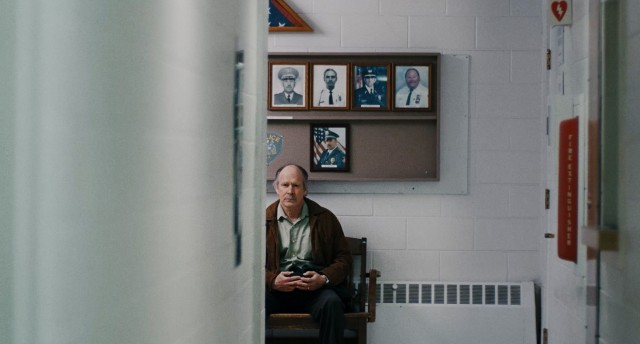As a parent, I’ve always avoided putting pressure on my children. My only wish is for them to become decent, respectful adults who consider the needs of others alongside their own. But what if things don’t turn out that way? What if, like the son in Ian Barling’s gripping short film Safe, you find yourself with a child on a troubling downward spiral? Would you cover for their mistakes, or would you make them face the consequences?
Following a brief exposition showing two young women trying to gain access to a busy nightclub, Barling thrusts his viewers into the central dilemma of his film, as we join a mother and father in the police station. As the pair answers questions about their “careless” son, it quickly becomes evident that they have differing views on their child’s behaviour – the mother is clearly at the end of her patience, while the father wants to dismiss it as youthful ignorance.
As the interview scene concludes, the camera follows the father to his job at a defunct casino. Relieving the security guard from his post, he blocks one of the monitors from view, hinting that this devoted parent has something he’s desperate to protect, something he’s determined to keep safe. When the situation escalates, he’ll have to decide whether to stick to his guns or do the right thing.

Will Patton as Francis, the devoted father facing a dilemma over what to do with his wild son
Born from a desire to tell a story about his hometown and its inhabitants, while also exploring the “fractured connection” with his “largely absent father,” Barling’s narrative truly took shape when he discovered the gutted casino that became the setting for his short. Eager to capitalise on this “impressive, haunting space,” the writer/director tailored his script to use the location as the perfect hiding place for the father’s secret, while also using it to enhance the film’s tone and visuals.
Films set in casinos are often characterised by the drama that accompanies the gambling within them. Although Safe isn’t focused on that traditional form of wager, it’s still a short centred around risk and decision – and just as tense. In production terms, those aforementioned films usually rely on quick cuts to show cards being dealt, bets being placed and faces reacting, but Barling is going for a very different vibe in his short.
“The goal was to create a sparse yet elegant, clinical yet voyeuristic visual language”
Aiming to create a film portraying “a sense of realism and honesty to the characters, situations and places”, the director worked with cinematographer Anna Franquesa-Solano to form a visual language that was “sparse yet elegant, clinical yet voyeuristic”. Aiming to position the viewer as “a sort of spy”, these production decisions prove critical in the success of the short, as they help to add a simmering tension to proceedings, while also placing you in the headspace of this troubled father.
A unique, yet widely relatable short, Safe was created as Barling’s thesis project while studying at Tisch School of the Arts. Following a World Premiere at Cannes, the short had a successful festival run, before being released online as a Vimeo Staff Pick Premiere. With this film working as an assured, confident showcase of its creator’s directorial talents, we’re not surprised to learn that a feature adaptation, titled Francis, is in the works.

 Rob Munday
Rob Munday